Asylum seekers in sweltering Bushwick rely on kindness of strangers
July 9, 2023, 10:01 a.m.
Neighbors and volunteers have opened their homes, shared community space, including at Bushwick City Farm, and helped pick up slack where city efforts have fallen short.
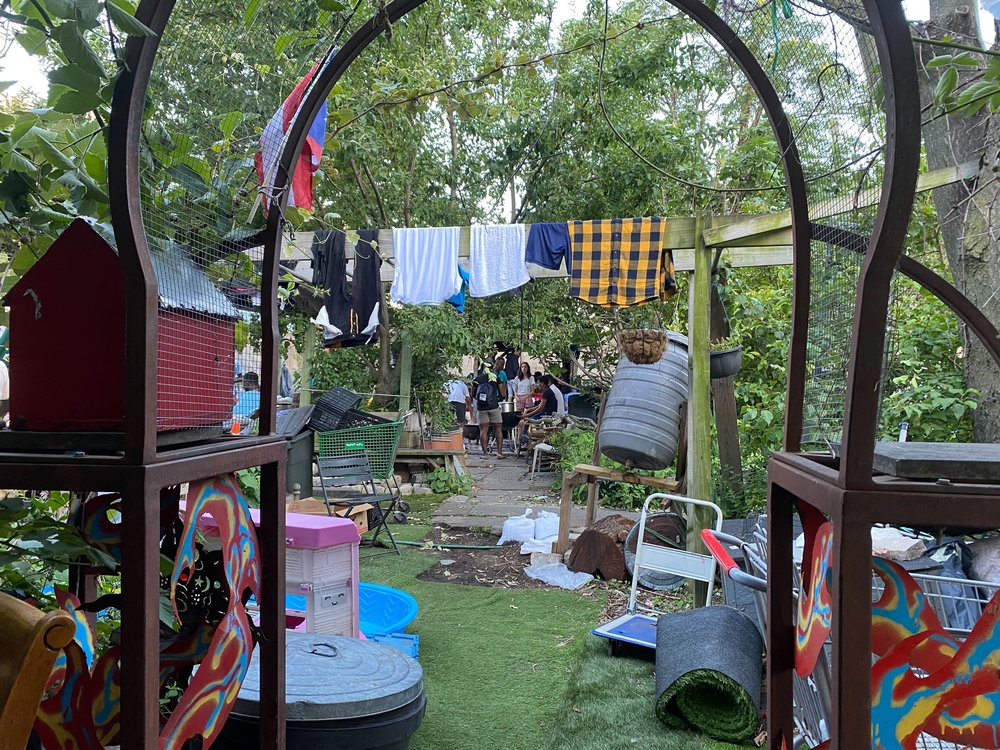
As the temperature hit the high 80s and the heat index went well into the 90s, Mustapha El Habib sat in a community garden in Bushwick on a recent evening and longed for a shower.
In the week since he arrived in New York from the Northwest African nation of Mauritania, he had gone more days without showering than with. “I’m so dirty,” he said.
Along with hundreds of others, the 26 year old is staying in a city “respite center” at 359 Stockton St., one of many temporary facilities that Mayor Eric Adams' administration has opened to accommodate an ever-growing number of migrants, more than 100,000 in the last year.
City officials have scrambled to expand the number of facilities housing asylum seekers, but in the process they’ve come under fire from elected officials, immigrant rights activists, and the new arrivals themselves, who complain many of the makeshift digs lack essentials, such as laundry, lockers to store belongings, adequate food service, and even showers.
During the recent heatwave, a portable shower trailer appeared outside the Stockton site, but a local activist said it had not been made operational and remained in the garage of the building.
A spokesperson for the mayor, Kayla Mamelak, said the city was hoping to have the portable shower trailer up and running "in a few days" and that as a workaround, migrants were being directed to shower at a nearby public swimming pool.
"While asylum seekers temporarily staying at the respite center in Bushwick have access to a viable shower option, we are in the process of providing a more convenient option," Mamelak said in a statement.
Similar complaints surfaced at a recent City Council oversight committee hearing, where Zachary Iscol, who heads the Office of Emergency Management, said the city was doing the best it could under trying circumstances.
“The alternative is people sleeping on the streets,” Iscol said.
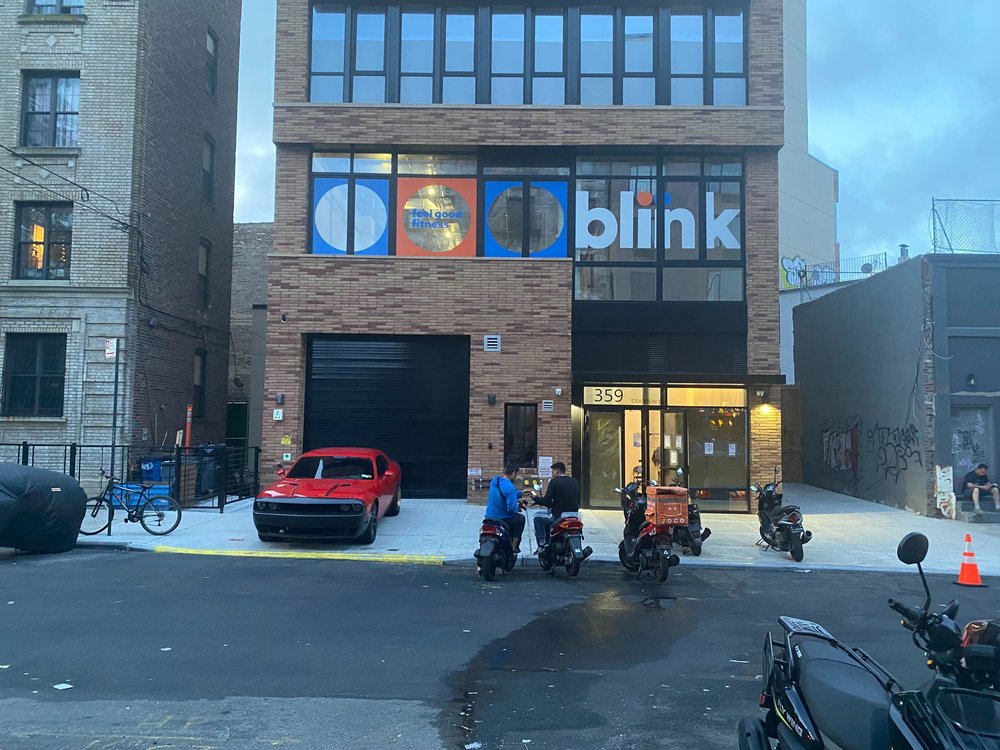
While the city’s provisions have been called into question, the migrants say they have been receiving generous help from a mutual aid group active in the Brooklyn neighborhood. The volunteers have helped with food runs, opened their homes – and showers – to the migrants, and shared community spaces as well.
On Thursday evening, neighborhood volunteers at Bushwick City Farm, the ramshackle community garden across the street from the respite center, mixed with dozens of migrants as some of the men prepared vats of Mauritanian chicken stew and rice cooked over an open fire.
Nearby, two hens that had escaped from the farm chicken coop wandered about. Some of the migrants chatted with one another in Arabic, Spanish or French, checked their phones or lounged in a large blue chair that someone had long ago spray painted: “No Good Cops, No Bad Dogs... Free Palestine.”
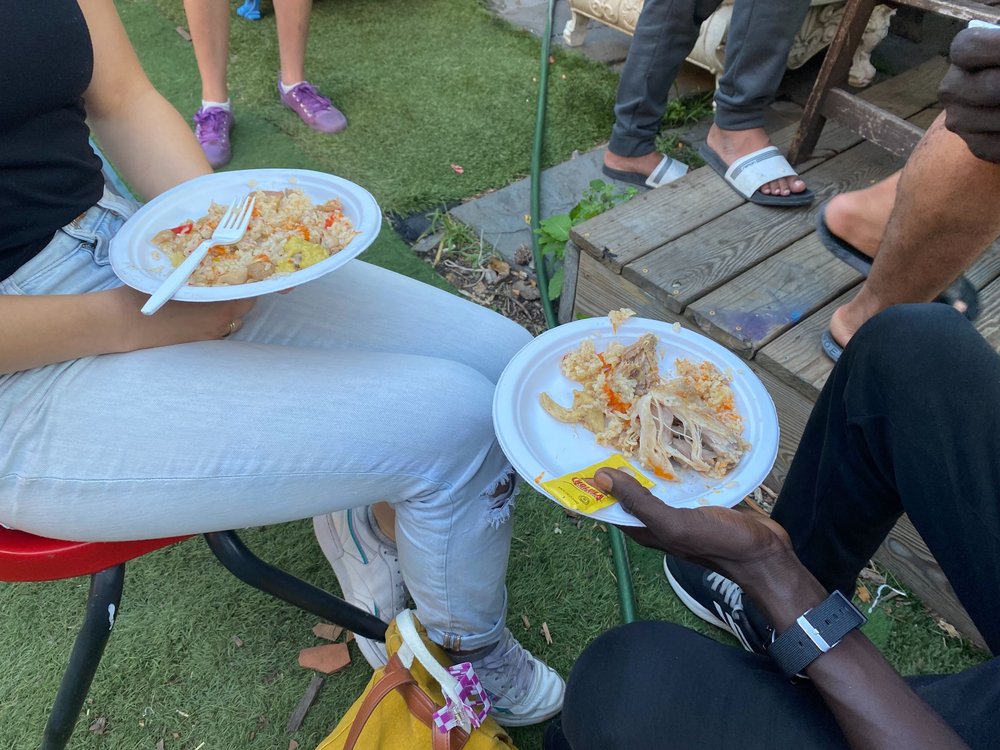
Mariel Acosta, a longtime Bushwick City Farm volunteer who helped mobilize the community when migrants began to arrive at the site last week, smiled as two men from Mauritania sat on the side-by-side swings of the swing set and swung themselves up toward the sky.
“This is what we're here for,” said Acosta, “because we are able to give this space for them to hang out, to be happy for a little bit. They sometimes sit down to play cards or to talk or cook.”
At the same time, Acosta was critical of the city’s response and the conditions inside the nearby facility.
“It's pretty dehumanizing and oppressive,” said Acosta. She noted that the floors of the facility were unfinished.
“It's just like concrete,” said Acosta. “It's getting dusty. So they have reported getting respiratory issues.”
One 54-year-old Venezuelan resident of the facility, Richard, coughed throughout an interview, although it was unclear whether this was at all connected to the conditions inside.
He said he hadn’t bathed in three days and that lights inside the congregate setting were left on all night, “like a prison.”
“It's a disaster in there,” said Richard, who asked that his full name not be used because of his immigration status and he feared reprisals from authorities for complaining. “We are around 140 people on one floor.”
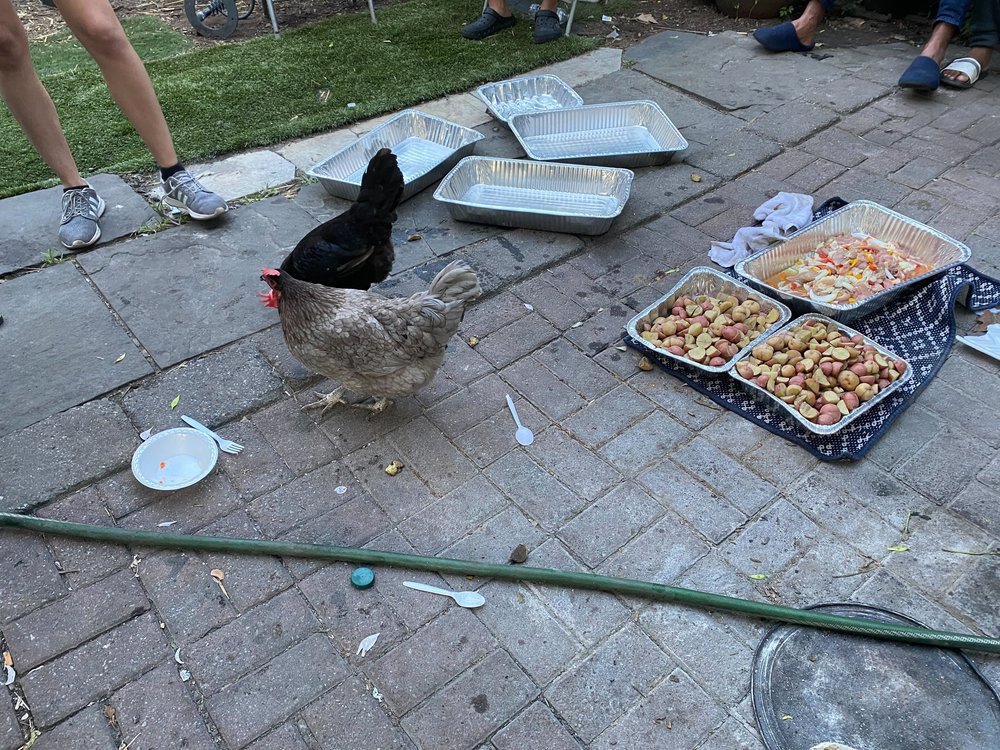
Despite the challenges, Richard said he feels welcomed.
“I am so grateful for this community,” he said. “They give us a hand to try to help us.”
Some migrants have used the showers in the homes of nearby residents. El Habib said he’s gone that route on three occasions, and he’s grateful for the help.
“The people here are so kind,” he said, referring to the volunteers. “Not there,” he added, gesturing to the city shelter.
Upon arriving at the local public swimming pool, some migrants were initially turned away because they weren’t dressed in swim trunks. Once again, the mutual aid team sprung into action, buying swim trunks, flip-flops and locks, so the newcomers could safeguard their belongings in lockers at the pool.
The philosophy of mutual aid, said volunteers at the farm, was meant to set it apart from charity, and allow the migrants to care for themselves, including by cooking for themselves. Yajaira Saavedra, who helps run La Morada’s Mutual Aid Kitchen, said volunteers helped out by conducting a mega shopping run at Costco. They loaded up on chicken, rice, peppers, carrots, and other vegetables, bought 12 gallons of milk, electrolytes, paper plates, cups and utensils, as well as soap, razors, and spices like parsley, garlic and turmeric.
“This all came out to be $1,200,” said Saavedra. “It was just like a Subaru full of stuff. This was through mutual aid, just in-kind donations. Neighbors pitching in.”
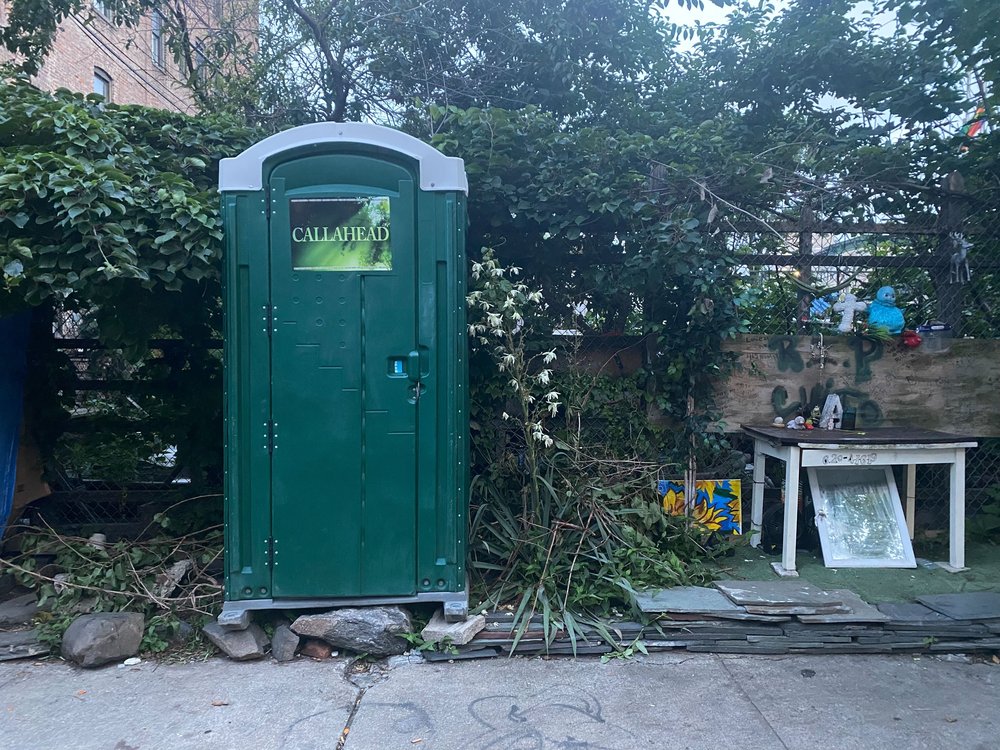
The volunteers also procured portable toilets that now stand outside the Bushwick City Farm. Volunteer Acosta said a “shower truck” arrived outside the respite center last week but was never put into action and now sits in a garage nearby.
Elijah Fox, an aide to Councilmember Chi Ossé, whose district encompasses the site, said the councilmember was closely following the situation and advocating on behalf of migrants.
“We will continue to press the administration to provide the necessary resources to the people at this center specifically and other similar centers around the city, ” Fox said.
Some activists noted that sanitation issues had plagued other shelter locations, including in midtown.
“We have been in touch with migrant families with young children placed at the Roosevelt hotel that were unable to shower for days, slept in chairs in a public space and weren’t assigned rooms,” said Ariadna Phillips, a member of South Bronx Mutual Aid. “I think that all the men’s sites are generally a concern. The men in particular have been treated inhumanely over time.”
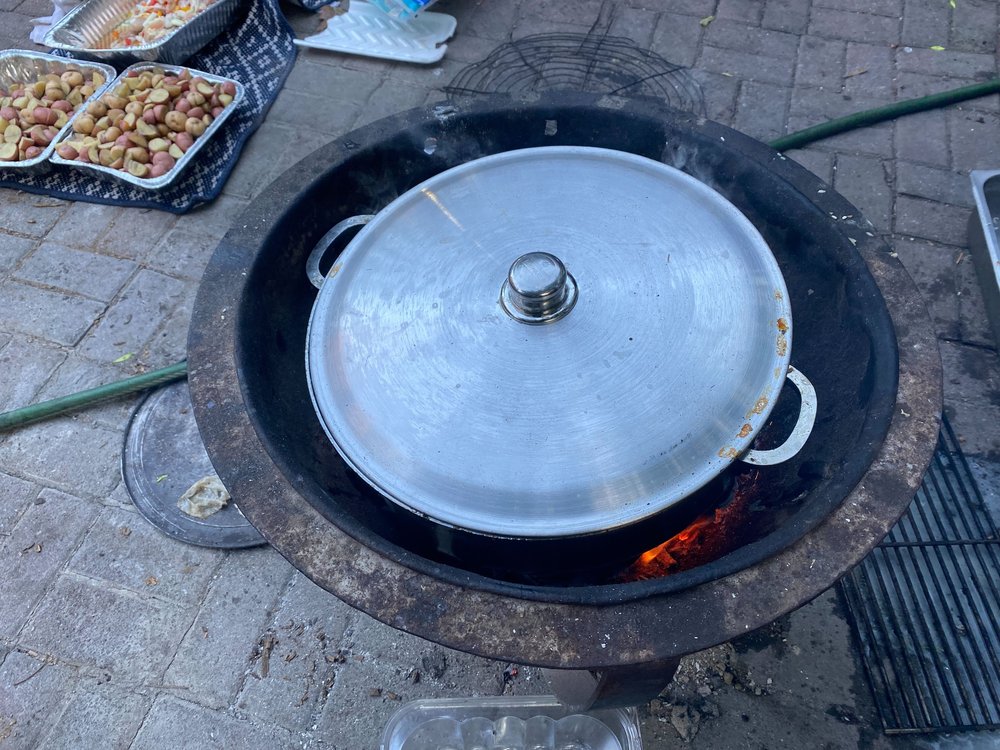
Last month, the issue of providing basic sanitation and other amenities prompted a heated exchange between Iscol of the Office of Emergency Management and Councilmember Shahana Hanif.
Iscol argued that the city simply didn’t have the capacity to ensure that every facility housing migrants had every necessary provision.
On Friday, Hanif, who is pushing legislation that would ensure minimum standards in congregate shelters, issued a statement regarding the situation at 359 Stockton.
“I understand our City is stretched for space to house asylum seekers, but it is completely unacceptable for asylum seekers to resort to washing their clothes in a nearby garden because of lack of access to running water,” said Hanif.
“Our Right-To-Shelter mandates exist to ensure everyone in our City is housed with basic minimum standards that this administration seems fine ignoring,” Hanif said.
This story has been updated with additional comment from the mayor's office.
NYC spends nearly $370 daily on each asylum seeker household. The sum could top $1.4B this fiscal year. A year after the first asylum seeker buses left Texas, is NYC ready for more? Asylum seeker death spurs calls for more coordination and care from NYC officials